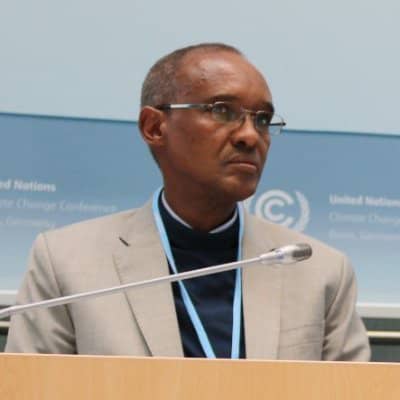Chuks Oyema-Aziken (Baku, Azerbaijan)
Ali Mohamed, Chair, African Group of Negotiators (AGN), has made a case for developing countries at ongoing COP29 In Baku Azerbaijan, saying adaptation and loss and damage remain central to Africa’s climate response.
Quoting 2023 report by the WMO, Ali said African countries are losing up to 5 per cent of their GDP, with many diverting as much as 9 per cent of their budgets to respond to climate impacts.
“By 2030, an estimated 118 million extremely poor people in Africa could be exposed to drought, floods, and extreme heat without sufficient intervention. In 2023 alone, disasters displaced over 5.7 million people across the continent.
“Adaptation is underfunded and many countries are underprepared to respond to increasing climate impacts. Scaling up finance and support for adaptation action is key for Africa, and especially to implement the adaptation goals agreed in the Dubai COP last year.
“On loss and damage, the African Group acknowledges the significant progress made in establishing the Fund last year. We need this Fund to be fully operational and support our countries to respond to the irreversible impacts of climate change
On his expectations from COP29 for Africa?He said “The stocktake is clear; we have significant ambition and implementation gaps in achieving the goals of the Paris Agreement. Kenya is current chair of the African Group and they key priorities and goals for this summit are agreed by all African ministers and endorsed by the Committee of Africa’s heads of states and government.
“These are Climate Finance: For Africa, success at COP29 rests on achieving an ambitious, transparent, and time-bound finance goal, aligned with the assessed needs of developing countries. Central to this goal is public international finance that is provided as grants, based on a burden-sharing agreement among developed countries, in line with their obligations under the Convention and the Paris Agreement.
“This agreed financial commitment should address the adaptation, loss and damage, and mitigation needs of developing countries, including just transitions. The decisions from this COP should send a strong signal to the international finance architecture, underscoring the need for reform and addressing debt sustainability challenges for developing countries, particularly the high cost of capital.
“This COP needs to finalise the pending technical rules for Carbon markets. It is great to know that already the COP endorsed some rules yesterday at the opening plenary. We look forward to engaging in the pending technical elements to make these mechanisms operational.
“Equity in the global response to climate change is key. We hope to agree on decisions at COP29 on strengthening global climate through enhanced international cooperation and an enabling financial environment to overcome barriers to sustainable development in the global transitions.
Mohamed who is Kenya’s Special Climate Envoy said the rejection of NCQG stemmed from the draft’s inadequate commitment to fair, accessible, and sufficient financing that aligns with the needs of vulnerable countries.
“And this rejection was not just by African countries, but the entire G77 bloc, which pointed out respectfully that the initial text appeared overly cautious on setting ambitious finance targets and provided loopholes that could allow developed nations to fall short on their pledges. It also heavily leaned toward private-sector financing without clear assurances for direct public finance contributions, which remain critical for.
“Let me be clear, our ideal outcome from the New Collective Quantified Goal (NCQG) negotiations is a quantum of finance of $1.3trn per annum by 2030, which is reviewed based on the needs of developing countries. The outcome should also include quality of finance based on the criteria of reducing the cost of capital, debt sustainability, and equitable finance terms, and as such prioritise public grants and highly concessional loans for adaptation.
“We also want transparency of finance, where common rules for counting and accounting are agreed. Thus, clear signals on the reforms of international financial systems from this COP are key to delivering affordable and accessible finance at scale.
“Beyond finance, African countries are advocating for Enhanced technology transfers. We need equitable access to clean and resilient technologies without restrictive intellectual property barriers. These technologies are essential for our adaptation and mitigation efforts.
“Africa is disproportionately impacted by climate change, with communities facing severe droughts, floods, and desertification. We require international support that directly addresses these adaptation challenges.
“We are demanding a clear roadmap and criteria to disburse funds from the Loss and Damage Fund, ensuring these resources reach those affected most urgently.
“Decision on just and equitable Just transitions that provides guidance for the integration of principles of equity and fairness in the planning and implementation of climate action within and outside of the UNFCCC.
“Operationalisation of Carbon Markets, Including establishing frameworks, regulations and systems to enable trade in carbon credits, incentivising emissions reductions, promoting sustainable practices, and fostering collaboration between governments, businesses, and communities.
“Developed countries, and the US in particular, often push for private financing and other “innovative” mechanisms to fund climate action. Where do you stand on this?
While we recognise that private finance can supplement public funding, it is not a substitute for the commitment that developed countries owe under the principle of Common But Differentiated Responsibilities (CBDR).
“Private finance often comes with terms that are less favourable for low-income countries, including conditions that can lead to debt accumulation. Our stance is that developed countries should first fulfil their obligations for public climate finance. Private financing can complement public funding, but the primary responsibility lies with governments to provide predictable, concessional, and accessible funds. Furthermore, any “innovative” mechanisms should be structured to serve the needs of vulnerable countries rather than the financial interests of private entities.
“Framing carbon trading as climate finance undermines the fundamental commitments of developed countries to provide direct financial support. Carbon trading, by its nature, focuses on market mechanisms that benefit entities with the capacity to participate in carbon markets. For African countries, carbon markets may offer some investment opportunities, but they cannot replace the need for robust, unconditional public finance.
“Our concern is that reliance on carbon trading to fulfil finance commitments diverts attention from the direct financial needs of vulnerable countries. Carbon trading should be seen as an additional tool rather than a substitute for committed climate finance.
“The impacts of climate change in Africa have reached a scale that demands dedicated financing for loss and damage. This is not a discretionary issue but a necessity for survival for many African communities facing existential threats due to climate change.
“The US has been a great ally for many African nations, and it is regrettable that its resistance to include loss and damage in climate finance discussions does not align with the urgency of the crisis we are facing. We hope that Washington will revise its position on this very important issue, and we will use the means available to us, as the AGN, to advocate for a mutually beneficial solution.
“Make no mistake, our aim is to demonstrate that loss and damage is not merely a political discussion—it is a moral obligation and a key component of climate justice. We seek clear inclusion of loss and damage as a core theme of focus for the NCQG and full operationalisation and resource mobilisation plan for Loss and Damage Fund, ensuring that it is accessible to countries in dire need.
He said the African Group supported the inclusion of CBAM on unilateral trade measures as proposed by the Basic Group.
“However, this did not enjoy consensus during presidency consultations and was not in the interest of the swift adoption of the agenda. Unilateral trade measures, such as the Carbon Border Adjustment Mechanism (CBAM) are a potential trade barrier that could adversely affect African economies.
“Many African countries are still reliant on carbon-intensive industries as they transition to greener economies, and we feel that imposing CBAM without adequate support for these transitions can harm their economies and reduce the resources they have for adaptation and resilience.
“The UNFCCC has clear provisions against such measures under Article 3.5. Measures taken to combat climate change, including unilateral ones, should not constitute a means of arbitrary or unjustifiable discrimination or a disguised restriction on international trade, and the lack of interest in discussing these issues from our partners is concerning. We hope that such discussions will be included in climate negotiations and countries are effectively guided through a multilateral, rules-based regime for climate action.
“While CBAM is not formally on the COP29 agenda, we believe the just transitions work programme and response measures should consider this matter. This is, however, continuously opposed by developed countries. The African Group is actively participating in these discussions to highlight our concerns about unilateral measures such as CBAM’s potential economic impacts. We are seeking to ensure that any future implementation includes exemptions or financial support for developing countries. We want to ensure that climate policies do not become inadvertent economic penalties for vulnerable nations.
“Africa has been calling for a balanced and equal treatment of Article 6.4 and 6.2, and finalisation of pending rules for both. With Article 6.4 decisions adopted at the COP opening plenary, it is time to focus on the pending issues for 6.2, ensure environmental integrity and safeguards to prevent greenwashing, and see to it that actions under these cooperative approaches result in real emission reductions.
“The operationalisation of Article 6.2 is closely linked to that of Article 6.4 in so far as many countries rely on the Article 6.4 mechanism (PACM) to generate credible and universally recognised units accepted to participate in international cooperation under Article 6.2. We will continue to advocate for transparency, equity, and inclusiveness in the implementation of Article 6.2..”



